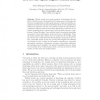76 search results - page 3 / 16 » Implicit Culture for Information Agents |
ATAL
2010
Springer
13 years 6 months ago
2010
Springer
Safety culture is broadly recognized as important for Air Traffic Management and various studies have addressed its characterization and assessment. Nevertheless, relations betwee...
ATAL
2005
Springer
13 years 11 months ago
2005
Springer
Abstract. Elderly people are a great repository of knowledge, the majority of which has never been gathered by formal means. In this paper we introduce an application of multi-agen...
AIED
2005
Springer
13 years 11 months ago
2005
Springer
Politeness may play a role in tutorial interaction, including promoting learner motivation and avoiding negative affect. Politeness theory can account for this as a means of mitiga...
GECCO
2010
Springer
13 years 10 months ago
2010
Springer
This study proposes a simple computational model of evolutionary learning in organizations informed by genetic algorithms. Agents who interact only with neighboring partners seek ...
ICAI
2004
13 years 6 months ago
2004
Current planning systems often fail to represent the reasons why certain planning decisions are made. Explicit representation of this Plan Rationale is crucial for automated plan m...

